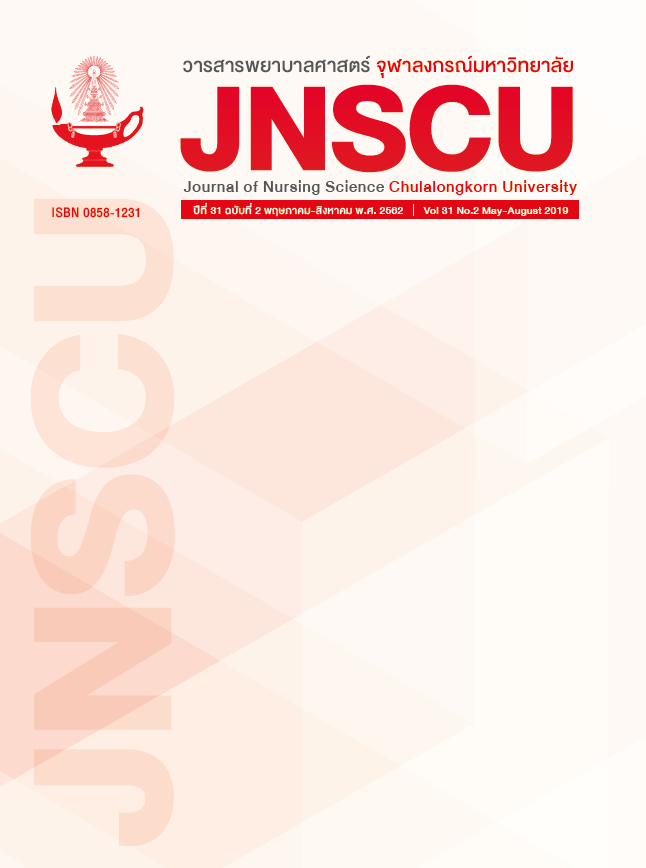การพัฒนาความสามารถของผู้ดูแลในการดูแลผู้ป่วยโรคหลอดเลือดสมอง
คำสำคัญ:
ความสามารถในการดูแล, ผู้ป่วยโรคหลอดเลือดสมอง, ผู้ดูแลบทคัดย่อ
วัตถุประสงค์: เพื่อศึกษาการพัฒนาความสามารถและประสบการณ์การดูแลผู้ป่วยโรคหลอดเลือดสมอง
ของผู้ดูแล
แบบแผนการวิจัย: การวิจัยกึ่งทดลอง
วิธีดำเนินการวิจัย: กลุ่มตัวอย่าง 38 คน เป็นผู้ดูแลผู้ป่วยโรคหลอดเลือดสมอง เครื่องมือวิจัยประกอบด้วย:
1) แบบสอบถามข้อมูลส่วนบุคคลและ 2) แบบประเมินความสามารถในการดูแล กลุ่มตัวอย่างได้รับการฝึก
ทักษะการดูแลผู้ป่วยเป็นเวลา 4 วันก่อนผู้ป่วยถูกจำหน่าย วิเคราะห์ข้อมูลส่วนบุคคลและจำนวนผู้ดูแล
ที่สามารถปฏิบัติกิจกรรมดูแลผู้ป่วยด้วยสถิติเชิงบรรยาย วิเคราะห์ความแตกต่างของคะแนนเฉลี่ย
ความสามารถในการดูแลผู้ป่วยของผู้ดูแลก่อน-หลังเข้าร่วมวิจัยด้วยสถิติ paired samples t – test ข้อมูล
การสัมภาษณ์ผู้ดูแลเกี่ยวกับประสบการณ์การดูแลได้นำมาวิเคราะห์เชิงเนื้อหา
ผลการวิจัย: คะแนนเฉลี่ยความสามารถในการดูแลผู้ป่วยของผู้ดูแลด้านการเตรียมอาหารสำหรับผู้ป่วย
ที่รับประทานเองได้และผู้ป่วยที่รับประทานทางสายให้อาหาร การทำความสะอาดร่างกายและการดูแล
การขับถ่ายสูงกว่าก่อนเข้าร่วมวิจัย แต่คะแนนเฉลี่ยการฟื้นฟูร่างกายต่ำกว่าก่อนเข้าร่วมวิจัยอย่างมีนัยสำคัญ
ทางสถิติที่ระดับ p<.05 ผลการสัมภาษณ์พบว่าการฝึกปฏิบัติกับผู้ป่วยจริงช่วยเพิ่มทักษะการดูแลของผู้ดูแล
สรุป: ก่อนจำหน่ายผู้ป่วยผู้ดูแลควรได้รับการฝึกปฏิบัติกับผู้ป่วยที่ดูแลและได้รับการประเมินผลการดูแล
ว่าสามารถปฏิบัติได้ถูกต้องเพื่อให้ผู้ดูแลสามารถดูแลผู้ป่วยได้อย่างมีประสิทธิภาพ
เอกสารอ้างอิง
Bureau of Non-communicable Diseases.Department of Disease Control. World paralysis day campaign issue 2017 [internet]. 2019. [cited 2019 June 14];
Available from: http://www.thaincd.com/2016/mission/documents-detail (in Thai)
Nilanont Y, Nidhinandana S, Suwanwela NC, Hanchaiphiboolkul S, Pimpak T,Tatsanavivat P, et al. Quality of acute ischemic stroke care in Thailand: a prospective multicenter countrywide cohort study. J Stroke Cerebrovasc Dis 2014;23(2):213-9.
Wongkachit C, NavicharernR. Factors related to eating behaviors in stroke patients. JNSCU 2015;27(3):80-92. (in Thai)
HouL, Du X, ChenL,Li J,YanP, Zhou M, Zhu C.Exerciseand qualityof lifeafter firstever ischaemic stroke: a two-year follow-up study. International Journal of Neuroscience 2018;128(6):540-8.
DOI: 10.1080/00207454.2017.1400971
Kasati A,Prachusilapa G.Rehabilitationnurse competencies.JNSCU 2014;26(3):134-45. (in Thai)
Majavong M. Stroke in the elderly. J Thai Stroke Soc 2019;18(1):59-74. (in Thai)
Rittada S, Taraput, C. How to take care of patients with stroke. J Thai Stroke Soc 2018;17(2):25-40. (in Thai)
Purba WS, Amatayakul A, Wattanakul B. The relationship between depressions, social support and quality of life of strokesurvivors inBukittinggi, Indonesia. J Health Res 2015;29(Suppl.1):S109-16. DOI: 10.14456/jhr.2015.57.
Billinger SA, Arena R, Bernhardt J, Eng JJ, FranklinBA, Johnson CM,etal.Physicalactivityand exerciserecommendations for stroke survivors. Stroke. 2014;45(8): 2532-53.
HRH PrincessMaha ChakriSirindhornMedical Center. Annual report 2018. (in Thai)
Moonthee W, Munkong S, Sirapo-ngam Y, Leelacharah S. Impact of transitional care programme and family caregivers on stroke patients’ routine activity performance, complications, and satisfaction. TJNC 2016;31(1):95-110. (in Thai)
Roy M, Bag R. Effectiveness of Structured TeachingProgrammeontheKnowledge about Rehabilitationof Stroke Patients among CaregiversinaSelected Hospital, Kolkata, India. Journal of Clinical and Diagnostic Research 2019;13(7):LC07- LC12.
Gurjar NR. Effectiveness of educationalprogramonknowledgeand competence ofhomecareof stroke patients among care givers. Int J Health Sci Res 2019; 9(5):260-5.
Donabedian A. An introduction to quality assurance in health care. CMJ 2003; 44(5):655-657.
Kusol M, Lertrat P. The development of nursing care to promote family participation in caring of patients with cardiovascular disease at Medical Department, Nongkhai Hospital. Independent study (M.N.S) Khon Kaen:
Khon Kaen University; 2009. (in Thai)
Phinyo P, Phinyo K, Limtrakool P, Tiamkao S, Worawong C, Chuasuan C,etal. Care improvement for patients with stroke through community participation. Songklanagarind Journal of Nursing
;35(2):93-111.
PrasanwongJ,SingdongP,Samsan,R. Caring system development for stroke’s patients at Sisaket Hospital. Journal of Nursing Division 2012;39(2):51-65.(in Thai)
Nishio D, Takahashi H, Hayashi T, Hirano Y, MinakawaT,KigawaH.Factorsinfluencing the burden on caregivers of stroke patients withhemiplegialivingathome. Int J Phys Med Rehabil [serial on the
Internet]2015[cited 2019June14];3(3): [about 5 p.]. Available from: http://dx.doi.org/10.4172/2329-9096.1000279



